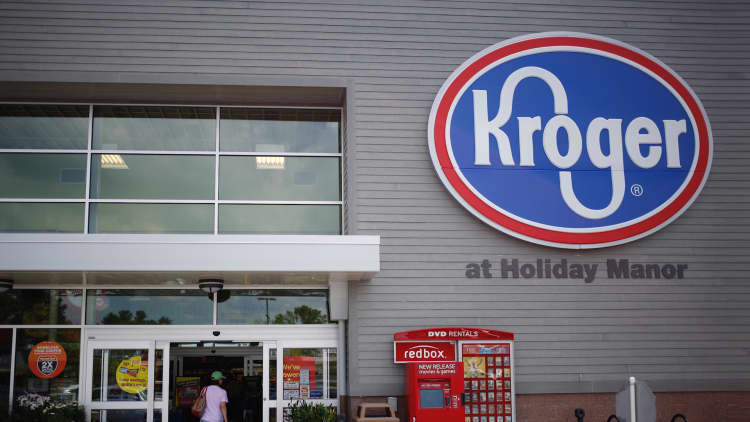Kroger is laying off hundreds of employees across the family of grocery stores it owns, a person familiar with the situation tells CNBC.
The unionized grocer, which also owns Harris Teeter, Ralphs, Fred Meyer, has 443,000 full-time and part-time employees.
A spokeswoman for Kroger told CNBC in a statement that "As part of ongoing talent management, many store operating divisions are evaluating middle management roles and team structures with an eye toward keeping resources close to the customer."
She added that the company's store divisions, which operate independently, are all "taking steps to ensure they have the right talent in the right store leadership positions."
Kroger is not the first grocer to reconsider middle management as it looks to restructure its business.
Walmart's club store, Sam's Club, in 2014 laid off 2,300 employees, including middle managers, as part of its turnaround. Last year, the retailer closed 63 stores and converted some of them to e-commerce facilities.
Shares of Kroger are down nearly 9% year-to-date, as it faces heightened competition from discount grocers Aldi and Lidl, as well as Walmart and Albertsons.
Kroger's turnaround plan to invest in e-commerce and take on those challenges is in doubt. In September, CEO Rodney McMullen told analysts Kroger would not be "reconfirming" its expectation that it would add $400 million in incremental operating profit as part of its three-year restructuring plan.
The grocer's e-commerce investments include its acquisition of meal kit company Home Chef, stake in British online supermarket Ocado and partnership with driverless car company Nuro.
Meantime, labor costs continue to be an issue for the company, as union pushback in the U.S. escalates, despite years-long declining union membership rates. Ten years after the Great Recession, more and more workers in the U.S are demanding profits that some believe have stayed largely in corporations' pockets.
"The truth is, Kroger spent $6 billion on stock buybacks in the last three years, instead of focusing on customer service and investing in those who provide that customer service – our Kroger members," a spokesperson for the United Food and Commercial Workers said in a statement to CNBC. "... Kroger should know that investing in the people working hard to make their company successful, not shareholders, is what makes grocery stores better, more competitive, and able to attract even more customers."
After threats of a strike in Southern California, Kroger reached a tentative deal with the United Food and Commercial Workers union last month. The region's last grocery strike, 15 years ago, reportedly cost the grocer $1.5 billion in sales. As of September, Kroger was still negotiating contracts that cover store associates in Las Vegas, Memphis, Portland and Seattle.
"Our financial results continue to be pressured by inefficient healthcare and pension costs, which some of our competitors do not face," Chief Financial Officer Gary Millerchip told analysts in September in the company's second quarter call.
Walmart, which has been pouring money into its grocery business, including announcing a nationwide unlimited grocery delivery service last month, does not have a union.
Amazon, which is planning to launch its own grocery store chain and expand its Amazon Go stores to airport shops and movie theaters, is likewise not unionized. The Whole Foods grocery chain it owns in September announced it is cutting medical benefits for up to 1,900 part-time workers starting Jan. 1, 2020.
Union rights is becoming a bigger issue in the wind-up to the 2020 presidential campaign. Sen. Bernie Sanders went to Walmart's annual meeting earlier this year to argue for a workers' spot on the company board. A number of Democrats running in key 2020 races next year have voiced their support of the 48,000 General Motors' autoworkers on strike in Detroit.
UPDATE: This story has been updated to include a statement from the United Food and Commercial Workers union.



